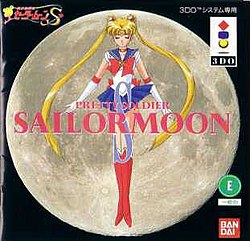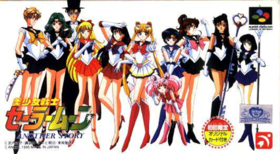List of Sailor Moon video games
| Sailor Moon | |
|---|---|
 |
|
| Developers |
Arc System Works Bandai Banpresto |
| Publishers | Bandai |
| First release |
Sailor Moon 1993 |
| Latest release |
Quiz Bishoujo Senshi Sailor Moon: Chiryoku Tairyoku Toki no Un 1997 |
| Sailor Moon | |
|---|---|
| Developer(s) | Arc System Works |
| Publisher(s) | Angel (Super Famicom in Japan) Bandai (Super NES in France) Ma-Ba (Mega Drive in Japan only) |
| Series | Sailor Moon Games |
| Platform(s) | Super Famicom/Super NES, Mega Drive/Genesis |
| Release date(s) |
Super Famicom/Super NES Mega Drive/Genesis
|
| Genre(s) | Beat 'em up |
| Mode(s) | 1 Player or 2 Players (Mega Drive version is 1 Player only) |
| Bishoujo Senshi Sailor Moon R | |
|---|---|
| Developer(s) | Bandai |
| Publisher(s) | Bandai |
| Series | Sailor Moon Games |
| Platform(s) | Super Famicom/Super NES |
| Release date(s) |
|
| Genre(s) | Beat 'em up |
| Mode(s) | 1 Player or 2 Players |
| Bishoujo Senshi Sailor Moon S: Jougai Rantou!? Shuyaku Soudatsusen | |
|---|---|
| Developer(s) | Angel |
| Publisher(s) | Angel |
| Series | Sailor Moon Games |
| Platform(s) | Super Famicom/Super NES |
| Release date(s) |
|
| Genre(s) | Fighting |
| Mode(s) | 1 Player or 2 Players |
| Bishoujo Senshi Sailor Moon S | |
|---|---|
 |
|
| Developer(s) | Bandai |
| Publisher(s) | Bandai |
| Series | Sailor Moon Games |
| Platform(s) | 3DO Interactive Multiplayer |
| Release date(s) |
|
| Genre(s) | Fighting |
| Mode(s) | 1 Player or 2 Players |
| Sailor Moon Arcade | |
|---|---|
| Developer(s) | Gazelle |
| Publisher(s) | Banpresto |
| Distributor(s) | Tecmo |
| Designer(s) | Junya Inoue |
| Series | Sailor Moon Games |
| Platform(s) | Arcade |
| Release date(s) |
|
| Genre(s) | Beat 'em up |
| Mode(s) | 1 Player or 2 Players |
| Cabinet | Upright |
| Bishoujo Senshi Sailor Moon: Another Story | |
|---|---|

Box art to Another Story
|
|
| Developer(s) | Angel |
| Publisher(s) | Angel |
| Series | Sailor Moon Games |
| Platform(s) | Super Famicom/Super NES |
| Release date(s) |
|
| Genre(s) | RPG |
| Mode(s) | 1 Player |
| Bishoujo Senshi Sailor Moon Super S: Zenin Sanka!! Shuyaku Soudatsusen | |
|---|---|
| Developer(s) | Angel |
| Publisher(s) | Angel |
| Series | Sailor Moon Games |
| Platform(s) | Super Famicom/Super NES |
| Release date(s) |
|
| Genre(s) | Fighting |
| Mode(s) | 1-2 players |
| Bishoujo Senshi Sailor Moon Super S: Shin Shuyaku Soudatsusen | |
|---|---|
| Developer(s) | Angel |
| Publisher(s) | Angel |
| Series | Sailor Moon Games |
| Platform(s) | PlayStation, Sega Saturn |
| Release date(s) |
PlayStation
|
| Genre(s) | Fighting |
| Mode(s) | 1-2 players |
| Quiz Bishoujo Senshi Sailor Moon: Chiryoku Tairyoku Toki no Un | |
|---|---|
| Developer(s) | Gazelle |
| Publisher(s) | Banpresto |
| Series | Sailor Moon Games |
| Platform(s) | Arcade game |
| Release date(s) | 1997 |
| Genre(s) | Quiz game |
| Mode(s) | 1-2 Players |
The Sailor Moon video game series is based on Naoko Takeuchi's manga and anime series of the same name. The series was released in Japan during the height of the media franchise's popularity. By 1998, twenty games were released. As of 1995, the games released each had sales figures of about 200,000 to 300,000. They have never been released in any other country, with the exception of the Bishoujo Senshi Sailor Moon game developed by Angel, which was released in France in 1994.
Sailor Moon (or Bishoujo Senshi Sailor Moon) is a beat 'em up video game developed by Angel in 1993, and ported to the Super Famicom. It was localized in the Europe exclusively in French in 1994. The Mega Drive version was developed and published by Ma-Ba, although certain elements were recycled from the Super Famicom version.
The game is set in the first series of Sailor Moon, and the player takes control of one or two of the five heroines. Each Sailor Soldier has some sequences of blows, three aerial attacks (neutral, moving forward/backward, downward) and a special charge-up projectile.
The enemies are mostly the youma of the Dark Kingdom that appeared in the anime, but if more than one of the same kind appears at once, the others are colored differently (a common device for this genre of games).
The Mega Drive version features most of the stages from the SNES version but a few were removed and replaced. Some of the boss battles are different as well, and a new hidden final boss, Queen Metallia is featured when playing on Hard Mode. The Mega Drive counterpart does not contain any of the music from the SNES game, with the exception of the main theme song at the title screen, bosses also has their own song rather than a generic theme for all of them. The game has different endings for each playable character.
Sailor Moon R is the sequel to the first Sailor Moon and introduced a new playable character, Chibiusa. Unlike other Sailor Moon games, it was developed and published by Bandai instead of Angel. The sprites from the previous game were redesigned with more detail and more animation frames for this game and the later games.
Like the Mega Drive version of the previous game, the bosses have their own theme music. By playing the game on hard mode, there is a minor change to the ending that involves Sailor Pluto. Monsters in this game were all droids. Like the previous game, there are several different shades of them. One of the other differences from the first game is the special attack that destroys all on-screen enemies.
...
Wikipedia
